
An advisory about the possible detection of fall armyworm (FAW) on sunflowers in Mpumalanga was a precautionary measure and should not be a cause for panic, according to Grain SA.
Dr Marinda Visser, manager of Grain SA’s Research and Policy Centre, said reports had been received of the pest on sunflower but these had not yet been confirmed in a laboratory.
She said that Grain SA had appointed the company Crop Watch to conduct detection and surveillance of FAW.
“It’s better to receive the information earlier rather than later,” she said, adding that the pest was under control in South Africa and the country was “not in crisis mode”.
Manager of early warning systems at the Department of Agriculture, Forestry and Fisheries, Jan-Hendrik Venter, confirmed that the department had received information from a reputable organisation of a possible detection of FAW on sunflower.
“But we haven’t received an official report yet,” he said.
He said the FAW steering committee met monthly and had not felt the need to meet more frequently.
“There are really very few cases this year. We know that it’s all over in Limpopo but this was something we predicted because it doesn’t get cold enough to kill it off.”
He said that the committee expected that from now on, FAW would always be present in areas such as Limpopo, KwaZulu-Natal and Mpumalanga.
“So we mustn’t get a fright every time we hear that FAW has been found in Limpopo,” he said.
Venter said there had been very few sightings in the Free State and North West to date, but the pest had been seen in Gauteng and the Eastern Cape.
He said there could be a number of reasons for the lower number of cases in these two provinces. These could include the longer-lasting drought, a smaller maize crop, the fact that chemicals had been registered, and proactive management by farmers.
“They know about the worm. They scout and spray earlier,” he said.
Venter said that permits were now available for the use of pheromone traps for early detection at farm level.
He added that in South Africa, the pest seemed to prefer to lay its eggs on maize or sorghum and not sunflower.
He urged farmers continue scouting, and report any suspected sightings to him on 012 319 6384 or by e-mail at [email protected].











